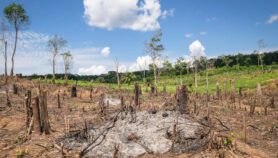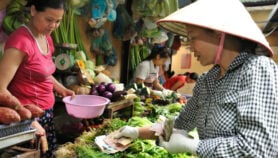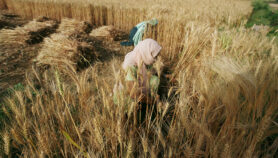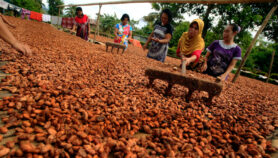Send to a friend
The details you provide on this page will not be used to send unsolicited email, and will not be sold to a 3rd party. See privacy policy.
[COLOMBO] A new climate impact research report warns of serious risks to the production of rice and other food crops in the South Asian region.
Released by the World Bank last month (19 June), the report, titled Turn Down the Heat, points to South Asia's vulnerability to multiple threats — increasing tropical cyclone intensity, sea-level rise, heat extremes and disturbances to the monsoon system that can put water and food sources at severe risk.
Christina Shanthi de Silva of the agricultural engineering department at the Open University of Sri Lanka told SciDev.Net that the north-east monsoon is likely to decrease significantly by 2050.
"The impact will be borne by key rice-producing areas in the region," De Silva said. "Rainfall increase in the wet zone will bring issues of infrastructure damage, loss of livelihood and the coping capacity of communities. In Sri Lanka, the dry zone will become drier and the wet zone wetter, impacting the seasonal balance."
Crop security would emerge as a top regional concern, said Srinath Dixit of the Hyderabad-based National Initiative on Climate Resilient Agriculture, under the Indian Council of Agricultural Research, noting a reduction in pre-monsoonal crops and increased reliance on winter crops. "Bangladesh, India, Nepal and Afghanistan top the climate vulnerability index with food security threatened."
Ahamud Hassan, a director at the Dhaka-based Centre for Environmental and Geographic Information Services, told SciDev.Net that in 35 years the region’s coastal communities would face human safety issues due to rising and unpredictable seas that drastically alter coastal livelihoods. "But, tropical cyclones and storm surges will be more threatening than seal-level rise."
"With South Asian coastlines located close to the equator, projections of local sea-level rise show a stronger increase compared to higher latitudes," the World Bank report said.
Chandra Bhushan, deputy director-general of the New Delhi-based Centre for Science and Environment, said that unusually hot and extreme summer months are already living experience in cities like New Delhi. "Temperature rise will result in heat waves and a substantial increase in mortality associated with such heat extremes is likely," Bhushan added.
The Turn Down the Heat report by the World Bank
Released by the World Bank last month (19 June), the report, titled Turn Down the Heat, points to South Asia's vulnerability to multiple threats — increasing tropical cyclone intensity, sea-level rise, heat extremes and disturbances to the monsoon system that can put water and food sources at severe risk.
Christina Shanthi de Silva of the agricultural engineering department at the Open University of Sri Lanka told SciDev.Net that the north-east monsoon is likely to decrease significantly by 2050.
"The impact will be borne by key rice-producing areas in the region," De Silva said. "Rainfall increase in the wet zone will bring issues of infrastructure damage, loss of livelihood and the coping capacity of communities. In Sri Lanka, the dry zone will become drier and the wet zone wetter, impacting the seasonal balance."
Crop security would emerge as a top regional concern, said Srinath Dixit of the Hyderabad-based National Initiative on Climate Resilient Agriculture, under the Indian Council of Agricultural Research, noting a reduction in pre-monsoonal crops and increased reliance on winter crops. "Bangladesh, India, Nepal and Afghanistan top the climate vulnerability index with food security threatened."
Ahamud Hassan, a director at the Dhaka-based Centre for Environmental and Geographic Information Services, told SciDev.Net that in 35 years the region’s coastal communities would face human safety issues due to rising and unpredictable seas that drastically alter coastal livelihoods. "But, tropical cyclones and storm surges will be more threatening than seal-level rise."
"With South Asian coastlines located close to the equator, projections of local sea-level rise show a stronger increase compared to higher latitudes," the World Bank report said.
Chandra Bhushan, deputy director-general of the New Delhi-based Centre for Science and Environment, said that unusually hot and extreme summer months are already living experience in cities like New Delhi. "Temperature rise will result in heat waves and a substantial increase in mortality associated with such heat extremes is likely," Bhushan added.
The Turn Down the Heat report by the World Bank














